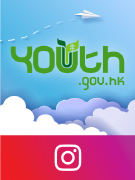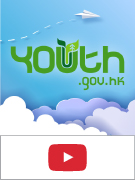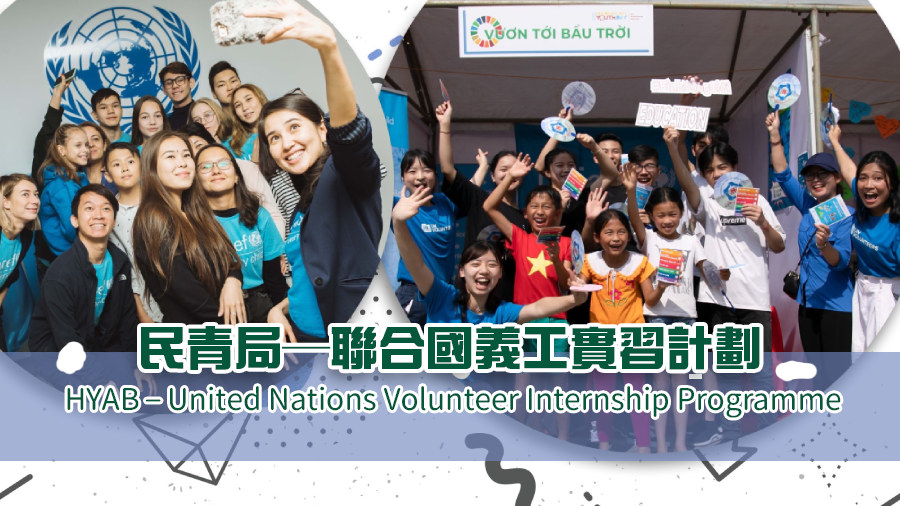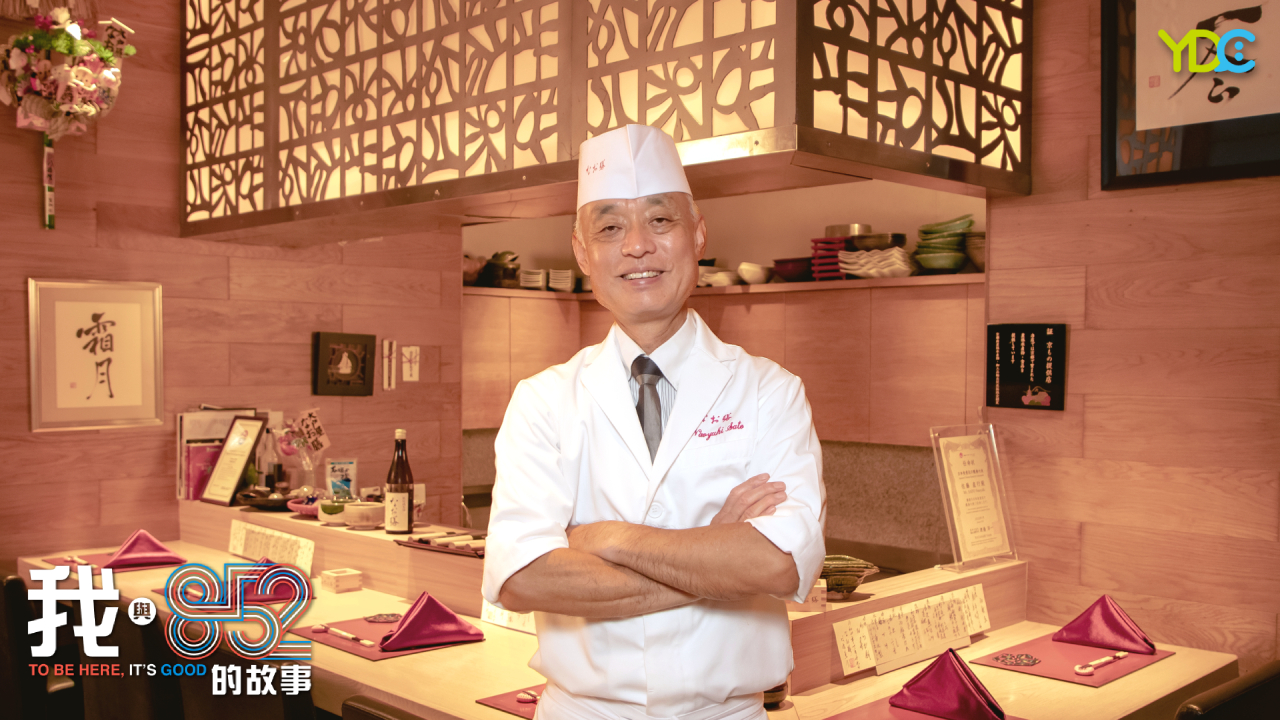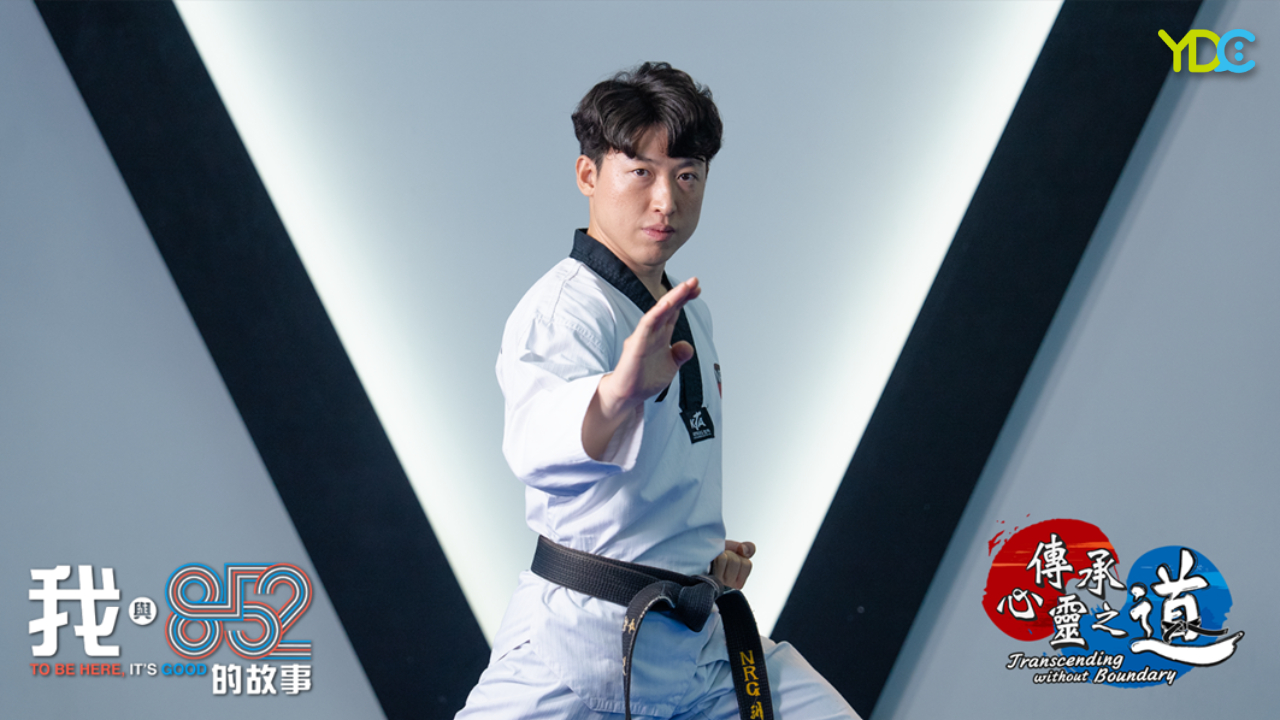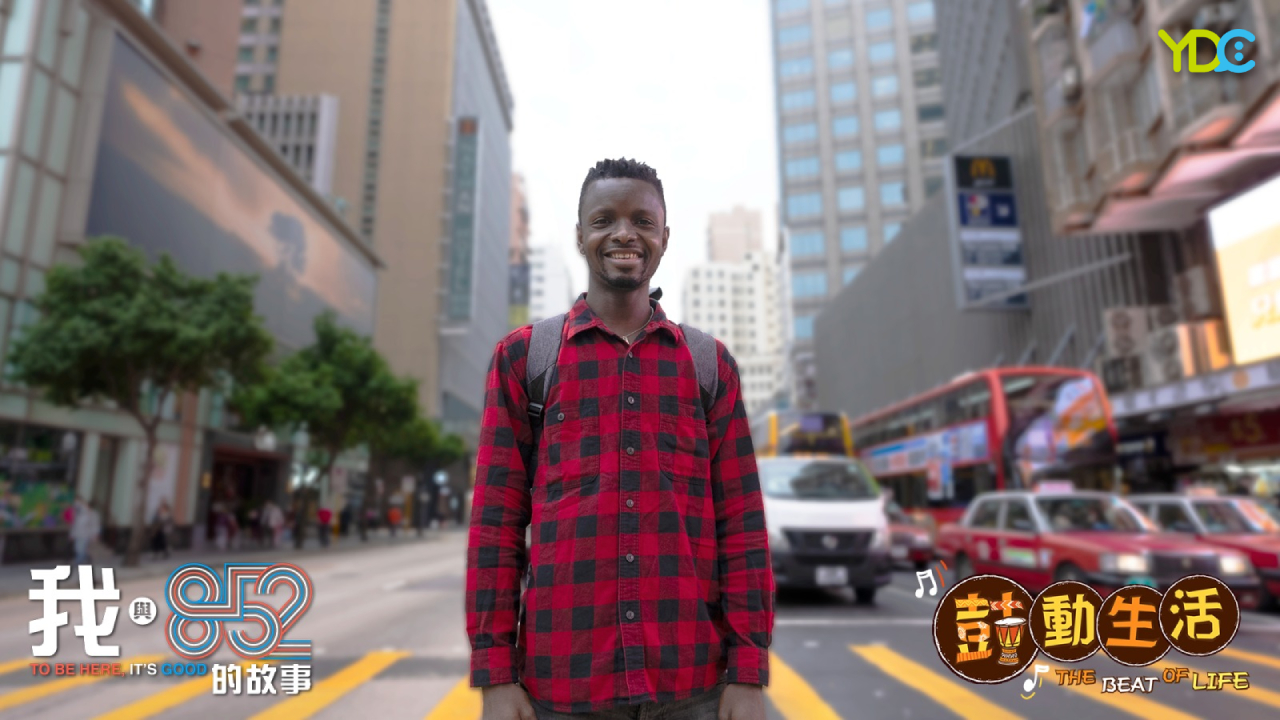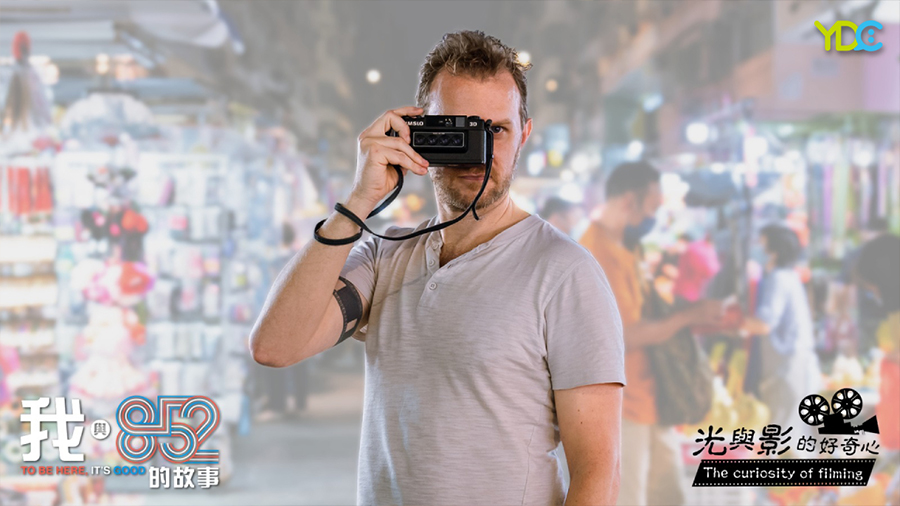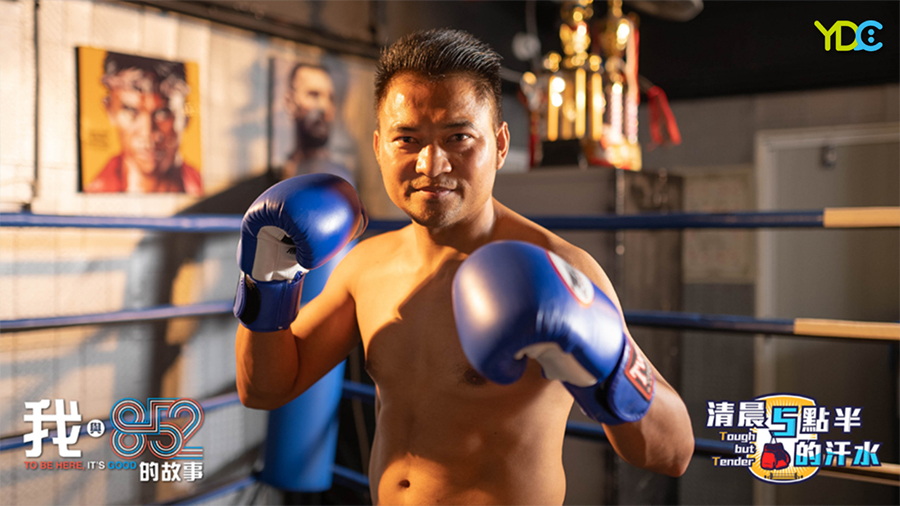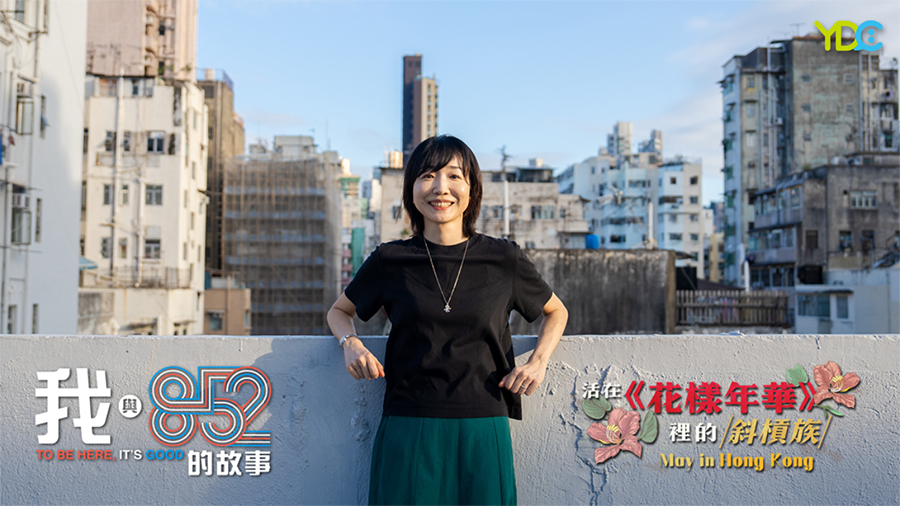#YDC
Search Result: 10
The Home and Youth Affairs Bureau (HYAB) has collaborated with the United Nations Volunteers (UNV) and 3 other local volunteer organisations (namely the Agency for Volunteer Service, Hong Kong Volunteers Association and The Peace and Development Foundation) to implement the HYAB – United Nations Volunteer Internship Programme (formerly known as the “United Nations Volunteers – Hong Kong Universities Volunteer Internship Programme”) since 2015. The purpose of the programme is to encourage the selected undergraduate students to develop their personal capacities and expand their horizons, as well as contribute to the international community as a Chinese youth volunteer. Participants of the Programme are fully funded by the Government to undertake 6-month assignments in the field units of various United Nations agencies overseas. These assignments cover specific disciplines such as health and education, environment and innovation management.
Programme HighlightsNo. of places in 2025-2620 participantsService Locations(Subject to change)Kazakhstan, Lao People's Democratic Republic, Nepal, Thailand, Uzbekistan and VietnamField Units(Subject to change)United Nations Children's FundUnited Nations Development ProgrammeUnited Nations Educational, Scientific and Cultural OrganizationUnited Nations Entity for Gender Equality and the Empowerment of WomenUnited Nations VolunteersFieldworkVolunteer interns will have the opportunity to participate in short-term field work organised by the United Nations agencies to experience the frontline work of the local service units (such as refugee assistance, disaster response, climate change, etc.), and to gain better understanding on the related issues.Internship Period6 months (from July to December 2025), not including the pre-departure training activities and the debriefing session after the volunteer internshipAllowance (Fully funded by HYAB)Round-trip air ticket from Hong Kong to the service location;Monthly living allowance during the volunteer internship period; andMedical / life insurance allowance during the volunteer internship period.Partner Universities (in alphabetical order)City University of Hong KongHong Kong Baptist UniversityHong Kong Metropolitan UniversityHong Kong Shue Yan UniversityLingnan UniversitySaint Francis UniversityThe Chinese University of Hong KongThe Education University of Hong KongThe Hang Seng University of Hong KongThe Hong Kong Polytechnic UniversityThe Hong Kong University of Science and TechnologyThe University of Hong KongEligibilitybeing holder of valid Hong Kong Permanent Identity Card/ Hong Kong Identity Card that aged 18-30;enrolled in a full-time undergraduate degree programme in one of the partner universities at the time of application submission;recommended by own university with good reference;proficiency in spoken and written English; knowledge of other languages of the working destination will be an asset;volunteering experience in or outside Hong Kong;high motivation, enthusiasm and intercultural competence;strong sense of national identity, global vision and sustainability;commitment to contribute to Hong Kong and Greater Bay Area;good communication and interpersonal skills; andliteracy in computer skills including Word, Excel, PowerPoint and social media.Application and EnquiriesThe closing date for application for this round is 24 January 2025. For more information, please visit the website of the Agency for Volunteer Service.
“To Be Here, It’s Good” is a brand new interview series brought to you by the Youth Development Commission, in connection with the “Youth Development Blueprint” of the Home and Youth Affairs Bureau. The series not only depicts the appearance of Hong Kong as a city but also reveals the stories of the non-locally born citizens who have already regarded Hong Kong as their “home away from home”. Starting from “852”, the international area code of Hong Kong, the series invites foreigners who have been living in Hong Kong for various durations to share their stories. Each of them came to Hong Kong for a different reason. How did they adapt to Hong Kong and, deal with the difficulties? What does Hong Kong look like in their eyes? And how did they discover the uniqueness of Hong Kong?Often times, we would be inspired by others’ stories. And sometimes we would even uncover something that has been forgotten or ignored. This series of little-known, genuine yet extraordinary "852" stories highlight that Hong Kong is multi-cultural, highly inclusive, full of opportunities and potentials.The public is welcome to watch the related interview videos or articles. Let’s rediscover Hong Kong and explore the infinite possibilities of “852” together.Determination and Dedication featuring Mr. Naoyuki Sato"Realising a dream is a long and enduring process. During the process, we would encounter different people and different situations. Some are good and some are bad. When facing challenges, we need to keep our perseverance. And to taste the fruit of success does not mean that one has to work on myriad things or trying multiple pathways. It actually means that we need to be focused and take every step with dedication."Mr. Naoyuki Sato aspired to become a chef since he was a child. When he was small, he enjoyed cooking with his mother in the kitchen a lot. After becoming a chef, he realised that working in a restaurant was not an easy job, especially the long working hours. Because of that, he struggled a lot. And during the process, he learned to be honest to himself and confirmed that becoming a chief chef is the calling of his life. Thereafter, he persists and strives towards this goal no matter what difficulty may lie ahead. Mr. Sato used to be a chief chef in Japan. He has experience serving in the restaurant of a renowned Japanese hotel as well as at the banquet welcoming leaders from various countries to Japan. In 1994, he received a secondment invitation to work in Hong Kong. At that time, he always wanted to work abroad. Despite having limited knowledge about Hong Kong, he believed that it was an invaluable opportunity and thus he accepted offer. And as a father, Mr Sato hoped to broaden his children’s horizons and let them experience the life abroad. That is why he decided to move to Hong Kong together with his family and ready to start a new chapter in a city with marked differences compared with Tokyo. Stepping out of the Kai Tak International Airport of Hong Kong, the first scenery that Mr. Sato saw was “tong lau” — which literally means 'Chinese building', and with people hanging laundry items and clothes outdoor. That gave him an impression that Hong Kong was not very developed. On the bright side, he was well taken care of, by both his Japanese and local Hong Kong colleagues, at the new workplace. Moreover, there was a Japanese department store near his home. Despite all the differences in culture, language and the environment, he adapted to the life in Hong Kong much faster than he would have imagined. At the beginning, he did not even set Hong Kong as part of his development objective. It was beyond his imagination that he would discover the charming aspects of this city and slowly fall in love with Hong Kong. The friendliness and hospitality of local Hong Kong people towards Japanese played a role in the process."Compared with Japan, the transportation network in Hong Kong is very convenient. There are country trails near the urban area and I can see the mountains and the sea when I open the window. That’s why I like Hong Kong a lot."The easy access to nature in Hong Kong has made Mr Sato a hiking fans."I have been to Hong Kong for 28 years. Hong Kong’s development has surpassed that of Japan in many aspects. Also, Hong Kong does not impose many restrictions on importing food ingredients. A lot of the food ingredients that I use are imported from Japan. Such convenience enables me to prepare top-notch Japanese cuisine here in Hong Kong and the quality in Hong Kong can be even better than that in Japan. At times, I place orders with local suppliers in Japan during late night. And in a few hours flight time, my orders arrive safely in Hong Kong. I can then prepare and serve them to my customers on the same day. Hong Kong is really a convenient place"Mr. Sato hopes to continue to promote Japanese cuisine in Hong Kong and introduce a wider variety of Japanese fresh food to Hong Kong, so that Hong Kong people can gain access to the best-in-class cuisine. To honour his contribution and dedication in promoting Japanese cuisine abroad, the Consulate-General of Japan in Hong Kong awarded him the Consul-General’s Commendation in 2020. It has never been an easy task to be a chef. Similar to that in Japan, working hours are long and training younger chefs is not at all easy as well. However, cooking is the way of life of Mr Sato and he would stay on with it for the rest of his life. It is the determination that keeps him going and, now it has been 45 years."Now as long as my customers appreciate the food that I prepared, I would be very satisfied"Some may use cooking as a metaphor for life. Varied ingredients coupled with different cooking methods offer boundless experience. And the motto of Mr Sato’s cooking life would be – “Be clear about your direction. And pursue it persistently.”Youth Development Commission"To Be Here, It's Good" Campaign webpage : www.ydc.gov.hk/852IG : www.instagram.com/youthdevelopmentcommission/Facebook : www.facebook.com/YDCgovhk
The Home and Youth Affairs Bureau announced the launch of a new round of the Thematic Youth Internship Programmes to the Mainland to provide young people with thematic internship opportunities in cultural, nature conservation and scientific research institutions on the Mainland. Six internships will be rolled out under the new round of the Thematic Programmes, including: "Hong Kong-Macao Youth Internship Programme at Palace Museum", co-organised with the Palace Museum in Beijing "Youth Internship Programme at Wolong Region of Giant Panda National Park", co-organised with the Sichuan Provincial Administration of the Giant Panda National Park "Youth Internship Programme at Chinese Academy of Sciences", co-organised with the Chinese Academy of Sciences "Youth Internship Programme at Dunhuang", co-organised with the Dunhuang Academy "Youth Internship Programme at Shandong on Marine Sciences", co-organised with Laoshan National Laboratory at Qingdao "Youth Internship Programme at Wuyishan on Biodiversity Conservation", co-organised with the Wuyishan National Park Administration Programmes OverviewThe internship programmes will commence from June to August this year and last for three to six weeks, providing Hong Kong youths with more than 110 thematic internship positions covering areas such as cultural heritage preservation, scientific research and technology, and ecological and environmental conservation. Through the internship, participants will gain an in-depth understanding and participate in the work of national cultural, nature conservation, and scientific research institutions, and acquire unique work experience by undertaking various training and research projects under the guidance of experts. Apart from internships, the co-organisers will also provide training, field trips and other cultural exchange activities for participants, thereby deepening their understanding of the local culture and industry developments. EligibilityApplicants should be local full-time post-secondary students (including sub-degree, undergraduate and post-graduate students) aged between 18 and 30, and holding a Hong Kong Permanent Identity Card or a Hong Kong Identity Card. Please visit the website of the Youth Development Commission for programmes information and application details.
“To Be Here, It’s Good” is a brand new interview series brought to you by the Youth Development Commission, in connection with the “Youth Development Blueprint” of the Home and Youth Affairs Bureau. The series not only depicts the appearance of Hong Kong as a city but also reveals the stories of the non-locally born citizens who have already regarded Hong Kong as their “home away from home”. Starting from “852”, the international area code of Hong Kong, the series invites foreigners who have been living in Hong Kong for various durations to share their stories. Each of them came to Hong Kong for a different reason. How did they adapt to Hong Kong and, deal with the difficulties? What does Hong Kong look like in their eyes? And how did they discover the uniqueness of Hong Kong?Often times, we would be inspired by others’ stories. And sometimes we would even uncover something that has been forgotten or ignored. This series of little-known, genuine yet extraordinary "852" stories highlight that Hong Kong is multi-cultural, highly inclusive, full of opportunities and potentials.The public is welcome to watch the related interview videos or articles. Let’s rediscover Hong Kong and explore the infinite possibilities of “852” together. Transcending without Boundary featuring Master No Rae"Hello, I'm No Rae. People also call me Master No. I've been in Hong Kong since 2014." Hello, my name is No Rae. “Taekwondo” is three letters in Korean. “Tae” means kicking and then have foot techniques, “Kwon” means to punch and then have hand techniques, and the last “Do” is the way of human and their learning about manners and respect. So we are trying to teach them not just punch and kick techniques. We also try to teach them how to control themselves, how to learn, how to respect your parents, teachers and each other.I'm a Taekwondo master in Hong Kong. I have trained Taekwondo since I was young. I also studied Taekwondo major in university. And then I tried to go other countries to teach Taekwondo, like Ukraine, Indonesia and Philippines. I want to promote the spirit of Taekwondo in other countries. That's why I asked the professor, “Where can I teach Taekwondo instead of Korea?” So he suggested me to come to Hong Kong. So that's why I choose to come here. I was not afraid to come to Hong Kong alone because this is what I want to promote Taekwondo abroad. Originally I planned to come to Hong Kong just for a year. But after I tried to teach Taekwondo in Hong Kong, I feel that Hong Kong parents care about the children's grooming and their development, and they spend a lot of time, also efforts on the children’s development. And also they have a good mindset, an open mind. I think it can be good to promote Taekwondo in Hong Kong. Taekwondo is not just teaching the knowledge and skills. We also need some connection with the children. It makes them more trained with the masters and follow the masters. Because after building a relationship and having a connection with them, they would understand how to respect, how to listen, how to concentrate and how to focus on the masters. We have several students who had some problems or some suffer with the ADHD. In the beginning they were very struggling to learn something because it was not easy for them to focus. But after training and then we encouraged them and trained them to focus, they overcome that and they get improved. And some students are already “black belt” now. So I think Taekwondo can help ADHD students too, to gain more focus and concentration. It's good to be here to be able to help nurture and contribute to Hong Kong society.I am so proud of and moved by their transformation. Actually when I came to Hong Kong, I feel that Hong Kong is not too different from Korea. Their work life and their lifestyle is very similar to Korean’s. They work hard and work until late and then they move very fast. And they are smart too and they are quick changing. In Korea, it’s also similar. Hong Kong is a very unique and also a multicultural city. Many other countries’ people come to Hong Kong to work. So I think that they have many chances to expose to different cultures and different styles. They don't have just a fixed culture because I think they have Eastern and Western culture together. So it's very interesting to have some stories with them and their mind too. Hong Kong is a very good place to learn about the global mindset. The young Hong Kong people are very smart and have good potentials. Hong Kong people normally speak like three languages: Cantonese, Mandarin and English. That means they have more chances to go to more markets. So I think they can go more global. So like me, if I can speak only Korean, I cannot go to other countries or it would be very difficult in the beginning. But you guys, the Hong Kong guys are easier than us. They can already learn about different cultures. Hong Kong young generation has a good potential and advantage. I think you can use this advantage to work hard in the future. So Hong Kong people, you guys can be global leaders. Fighting! Youth Development Commission"To Be Here, It's Good" Campaign webpage : www.ydc.gov.hk/852IG : www.instagram.com/youthdevelopmentcommission/Facebook : www.facebook.com/YDCgovhk
“To Be Here, It’s Good” is a brand new interview series brought to you by the Youth Development Commission, in connection with the “Youth Development Blueprint” of the Home and Youth Affairs Bureau. The series not only depicts the appearance of Hong Kong as a city but also reveals the stories of the non-locally born citizens who have already regarded Hong Kong as their “home away from home”. Starting from “852”, the international area code of Hong Kong, the series invites foreigners who have been living in Hong Kong for various durations to share their stories. Each of them came to Hong Kong for a different reason. How did they adapt to Hong Kong and, deal with the difficulties? What does Hong Kong look like in their eyes? And how did they discover the uniqueness of Hong Kong?Often times, we would be inspired by others’ stories. And sometimes we would even uncover something that has been forgotten or ignored. This series of little-known, genuine yet extraordinary "852" stories highlight that Hong Kong is multi-cultural, highly inclusive, full of opportunities and potentials.The public is welcome to watch the related interview videos or articles. Let’s rediscover Hong Kong and explore the infinite possibilities of “852” together. The beat of life featuring Ezekiel "Hi, I am Ezekiel Dagadu. I came to Hong Kong in 2018" Africa is full of music when it comes to Ghana. Nearly everybody is happy with music, drumming and singing and dancing as well. I am an African drummer, tutor and a performer as well. My name is Ezekiel Dagadu from Ghana, west of Africa. I found out about my drumming since I was a kid. I started drumming and then I just remembered those times when I used to drum and then my families and friends were going to drum. They never wanted me to go drumming and I was crying, I had to go, I was struggling with them and then, oh, they had nothing to do, then to say “Okay let's go together”. I came to Hong Kong in the year 2018. When my uncle called me and said, “Oh yeah, are you ready to work with me here in Hong Kong?” And I said “Yes, yeah, I'm ready” because this has been my first opportunity. I cannot say “No”, because I see it as an opportunity for me to take and then explore myself, and then share my passion and dream with all these in African drumming. In Ghana, once you're on the street, whether you know your friend or you don't know, you can say “Hi” or maybe just wave the hand, saying “Hello”, like, “What's up”, “How are you”, like this. And those in Hong Kong is a bit difficult. If you don't know the people, you cannot say “Hello”. But once they know you, they can really get on with you as well. I think during the Covid, most of our businesses in Hong Kong were down. So most schools have already been cancelled. Also we have to be running the classes online, and then together with the little savings that I have. I managed to live on it and then still hoping for better improvement. I see Hong Kong as a very nice and a good place to live despite very busy people running to and fro, and an environment which is full of many people. I still see more opportunities here for myself and then I think for anyone that comes here too. I think the language was really a problem to me, so it's really hard for me to order food easily because I cannot speak in the language. That's why I used to go and eat African food more often. Yeah, I know a few Cantonese like “Yao Gai Fan”, “Bolo Bao”. Family is family, you miss them all the time. But I don't put that aside my job. I do miss them. If I begin to think more about them, that means I have to give up and say “Oh, I miss my family”. And then I'm going back. My motto is to be happy all the time. You always have to live in the moment and all the time you have to be happy. Be yourself and let your passion guide you. I don't have to be rich to be happy, right? What I would say is for Hong Kong youth to keep trying, and then the more you try, the more you get it. Yeah, to keep persevering because I may say myself was also an example. This was what helped me. If I hadn't insisted on dragging into the car, I wouldn't be here in Hong Kong today. So what I’d like to say is give a try. Never give up. Youth Development Commission"To Be Here, It's Good" Campaign webpage : www.ydc.gov.hk/852IG : www.instagram.com/youthdevelopmentcommission/Facebook : www.facebook.com/YDCgovhk
“To Be Here, It’s Good” is a brand new interview series brought to you by the Youth Development Commission, in connection with the “Youth Development Blueprint” of the Home and Youth Affairs Bureau. The series not only depicts the appearance of Hong Kong as a city but also reveals the stories of the non-locally born citizens who have already regarded Hong Kong as their “home away from home”. Starting from “852”, the international area code of Hong Kong, the series invites foreigners who have been living in Hong Kong for various durations to share their stories. Each of them came to Hong Kong for a different reason. How did they adapt to Hong Kong and, deal with the difficulties? What does Hong Kong look like in their eyes? And how did they discover the uniqueness of Hong Kong?Often times, we would be inspired by others’ stories. And sometimes we would even uncover something that has been forgotten or ignored. This series of little-known, genuine yet extraordinary "852" stories highlight that Hong Kong is multi-cultural, highly inclusive, full of opportunities and potentials.The public is welcome to watch the related interview videos or articles. Let’s rediscover Hong Kong and explore the infinite possibilities of “852” together. Your best cheerleaders featuring Roy and EmmaRoy, "I am Roy. I came to Hong Kong in 2002." Emma, "Hello, my name is Emma. I came to Hong Kong when I was 17 years old. We were both born in the Philippines. We get married in Hong Kong. I used to work as the floor and bar manager." Roy, "And I used to work as a chef. Now we own our 42nd Davis Bar and Restaurant." Emma, "Before we opened our own restaurant, me and Roy worked somewhere else." Roy, "We were working in a company that we had been working for a long time. So we think that we can open our restaurant to have a better life, and we can have our own time together. Before, it was really really difficult to… when we opened our restaurant. There was no customer, there was no people, and just passing by." Emma, "But me and Roy, we're not losing hope. We're still thinking that we're here already, why not go for it? But back then, we tried calling customers outside, tried some promotion for food, like buy-one-get-one-free and free drinks. Our goal was to let customers try our food and then they spread the news. They kept inviting their friends and family to eat together. Starting from then, we build some customers, and they keep coming back. Local customers, for me at first, I thought they are difficult people. But somehow when you try to interact with them, talk to them, and give your heart to them, they will feel that you do everything with heart, and they will come back to you. ‘cause this is just like their canteen." Roy, "One of our missions when we started our restaurant is to help and support younger students. To be able to build their foundation, motivate them how to start their life and, finish their studies." Emma, "When I was young, I was only focusing on making money and not thinking about my own future. With limited education, I had to work two jobs, three jobs just to support and to earn the money that I wanted to. It was hard for me to pursue my dreams. That's why I think education is very important. Helping these students to work with me, I always encourage them after your graduation, you can go ahead and pursue your dreams, whatever you want it to be. This is just your stepping stone. In the future, if you're coming here one day wearing your suit, it's my big achievement." Roy, "Some people are thinking that we are just wasting our time teaching and training all the students and younger people. From our perspective, younger people are always our future. They are the ones who are going to build Hong Kong again, so we try our best to give them a foundation and confidence." Emma, "I treat everyone like my children. Even my children are working with me, helping me with the business. For everyone, I'm like their big mom. To bond with them, work with them, teach them how to be a better person." Roy, "It's good to be here, to be a big supporter of young people. Hong Kong is already our home. We consider ourselves as locals and we don't have any plans to leave Hong Kong." Emma, "I want everyone to know that Hong Kong is a big hope and a good opportunity for the young generation." Youth Development Commission"To Be Here, It's Good" Campaign webpage : www.ydc.gov.hk/852IG : www.instagram.com/youthdevelopmentcommission/Facebook : www.facebook.com/YDCgovhk
“To Be Here, It’s Good” is a brand new interview series brought to you by the Youth Development Commission, in connection with the “Youth Development Blueprint” of the Home and Youth Affairs Bureau. The series not only depicts the appearance of Hong Kong as a city but also reveals the stories of the non-locally born citizens who have already regarded Hong Kong as their “home away from home”. Starting from “852”, the international area code of Hong Kong, the series invites foreigners who have been living in Hong Kong for various durations to share their stories. Each of them came to Hong Kong for a different reason. How did they adapt to Hong Kong and, deal with the difficulties? What does Hong Kong look like in their eyes? And how did they discover the uniqueness of Hong Kong?Often times, we would be inspired by others’ stories. And sometimes we would even uncover something that has been forgotten or ignored. This series of little-known, genuine yet extraordinary "852" stories highlight that Hong Kong is multi-cultural, highly inclusive, full of opportunities and potentials.The public is welcome to watch the related interview videos or articles. Let’s rediscover Hong Kong and explore the infinite possibilities of “852” together. The curiosity of filming featuring Paul"Hello everyone, I'm Paul Shepherd. I'm from San Francisco. I live now here in Hong Kong." "I teach animation at the Hong Kong Baptist University. I spent a lot of my younger life living in different places. Just before moving here to Hong Kong, I spent about seven years in San Francisco. I was working at Stanford University, making films in the healthcare setting.""I had some difficult time trying to order food and just kind of pointing and getting stuff. But of course, now I can say a few things in Cantonese.""And I think actually Hong Kong is a very curious place. There's a lot of interest in trying new things. To be here, it's good. People want to make sure that the young people have a future, right? And that's very important. I really hope the youth of Hong Kong do feel encouraged. I think there are a lot of opportunities. It will take a little bit of time.""Honestly I think they do have a much better future. If you win through COVID, especially as a young person, it's time to be young and be excited again. So I hope you, you will be. And the reality is no matter what's going on, no matter where you are, you have to find your happiness wherever you are. If things are difficult, it's more about waiting. Waiting it out. Waiting out the bad and trying to find the thing that makes you happy. What is your happiness?" Youth Development Commission"To Be Here, It's Good" Campaign webpage : www.ydc.gov.hk/852IG : www.instagram.com/youthdevelopmentcommission/Facebook : www.facebook.com/YDCgovhk
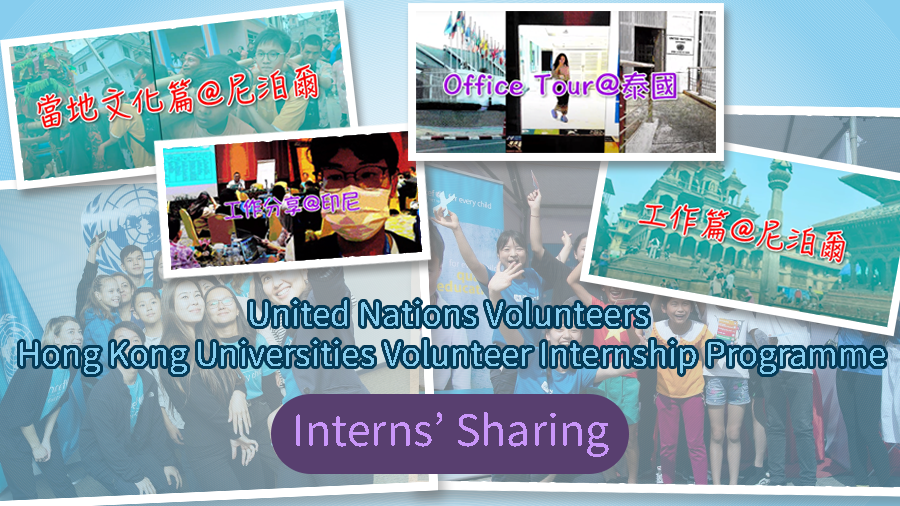
[Interns' Sharing] United Nations Volunteers - Hong Kong Universities Volunteer Internship Programme
With a view to furthering youth volunteerism, the United Nations Volunteers - Hong Kong Universities Volunteer Internship Programme funded by the Home and Youth Affairs Bureau has been launched by Agency for Volunteer Service with support from Hong Kong Volunteers Association and Peace and Development Foundation. It allows local university undergraduates to participate in a 6-month volunteer internship under the United Nations (UN) Youth Volunteer modality serving under UN field units or agencies in oversea. For programme details, please click here to visit another story. Interested in joining the programme? Videos on programme introduction and interns' sharing are as follows for you to know more! Programme Introduction Interns' Sharing
“To Be Here, It’s Good” is a brand new interview series brought to you by the Youth Development Commission, in connection with the “Youth Development Blueprint” of the Home and Youth Affairs Bureau. The series not only depicts the appearance of Hong Kong as a city but also reveals the stories of the non-locally born citizens who have already regarded Hong Kong as their “home away from home”. Starting from “852”, the international area code of Hong Kong, the series invites foreigners who have been living in Hong Kong for various durations to share their stories. Each of them came to Hong Kong for a different reason. How did they adapt to Hong Kong and, deal with the difficulties? What does Hong Kong look like in their eyes? And how did they discover the uniqueness of Hong Kong?Often times, we would be inspired by others’ stories. And sometimes we would even uncover something that has been forgotten or ignored. This series of little-known, genuine yet extraordinary "852" stories highlight that Hong Kong is multi-cultural, highly inclusive, full of opportunities and potentials.The public is welcome to watch the related interview videos or articles. Let’s rediscover Hong Kong and explore the infinite possibilities of “852” together. Tough but Tender featuring Cheaw "Hello! I am Padiphan Kerdchutturat. My nickname is Cheaw. I came to Hong Kong in 2015.""Since my first day of work in Hong Kong, I have been thinking, if I keep working, I can start my own Muay Thai gym in the future. I can do it. Since then, I started to upgrade myself, to learn how to teach Mury Thai and keep consulting experienced coaches on how Hong Kong people would like to learn Mury Thai.""I have a Muay Thai gym student. She has a friend who lives in Discovery Bay. She introduced me to teach them in Discovery Bay. They wanted to have classes at 6am. We started with two students, my students and her friend. Then some people saw that I was teaching Muay Thai. They realized that there was a Muay Thai class at 6am. They said they also wanted to join. Later, more and more people joined and they learned together.""Hong Kong is like my second home. Hong Kong has helped improve my family condition and make my parents' living standard better. And I want to live with my mother in Hong Kong. I want her to stay by my side. I want her to cook for me. I want to bring her to Hong Kong. Because Hong Kong is safe. And being able to work by her side makes me happy." Youth Development Commission"To Be Here, It's Good" Campaign webpage : www.ydc.gov.hk/852IG : www.instagram.com/youthdevelopmentcommission/Facebook : www.facebook.com/YDCgovhk
“To Be Here, It’s Good” is a brand new interview series brought to you by the Youth Development Commission, in connection with the “Youth Development Blueprint” of the Home and Youth Affairs Bureau. The series not only depicts the appearance of Hong Kong as a city but also reveals the stories of the non-locally born citizens who have already regarded Hong Kong as their “home away from home”. Starting from “852”, the international area code of Hong Kong, the series invites foreigners who have been living in Hong Kong for various durations to share their stories. Each of them came to Hong Kong for a different reason. How did they adapt to Hong Kong and, deal with the difficulties? What does Hong Kong look like in their eyes? And how did they discover the uniqueness of Hong Kong?Often times, we would be inspired by others’ stories. And sometimes we would even uncover something that has been forgotten or ignored. This series of little-known, genuine yet extraordinary "852" stories highlight that Hong Kong is multi-cultural, highly inclusive, full of opportunities and potentials.The public is welcome to watch the related interview videos or articles. Let’s rediscover Hong Kong and explore the infinite possibilities of “852” together. May in Hong Kong featuring Mayumi"Hello everyone. I am Mayumi. I came to Hong Kong in 2014. My name is Mayumi. And you can call me May.""I wanted to communicate with Hong Kong people more easily and to better integrate into Hong Kong society. I think that to integrate into a new place, mastering the local language is crucial. Also, I find the tone (and pronunciation) of Cantonese very beautiful. "Chop-chop la", "Lets go together la", "No way gwa". I think these"la","jei","ar ma"are really pleasing to my ears.""And meet people from different countries every day. It is very different from Japan. Hong Kong is very attractive to me. That's why even though I knew nothing about Hong Kong back then. I still decided to come to Hong Kong. Till now, I have no regrets. It was my dream to live in Hong Kong and I have made my dream come true. I am so haapy to stay in Hong Kong now. I will continue to discover Hong Kong and a better me." Youth Development Commission"To Be Here, It's Good" Campaign webpage : www.ydc.gov.hk/852IG : www.instagram.com/youthdevelopmentcommission/Facebook : www.facebook.com/YDCgovhk


